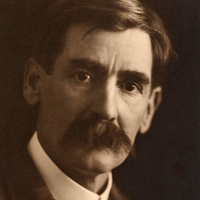The Fairy West
I.
We wrote and sang of a bush we never
Had known in youth in the Western land;
Of the dear old homes by the shining river,
The deep, clear creeks and the hills so grand.
The grass waved high on the flat and siding,
The wild flowers bloomed on the banks so fair,
And younger sons from the North came riding
To vine-clad homes in the gardens there.
We wrote and sang—and the Lord knows best—
Oh, those dear old songs of the fairy West!
We dreamed and sang of the “bustling mother”;
The brick-floored kitchen we saw so clear,
The pranks and jokes of the youngest brother,
The evening songs of our sisters dear.
The old man dozed in the chimney corner,
Or smoked and blinked at the cheerful blaze,
Or yarned with a crony—old Jack Horner—
Who’d known him back in the Digging Days.
We worked and sang—and the Lord knows best—
Oh, those dear old homes of the fairy West!
By tracks that ran ’neath the granite ridges
The children played on their way from school—
By the fairy dells and the sapling bridges,
And stole a swim in the willowed pool.
And home they flocked with their ceaseless chatter,
Till, happy and tired, and washed and fed—
(The wash came after—it doesn’t matter)
They said their prayers and they went to bed.
We worked and dreamed—and the Lord knows best—
Oh, those dear old ways of the fairy West!
We rose at daylight, refreshed and hearty,
And drank our tea while the children slept;
We worked with the zest of a camping party,
While the morning breeze through the gum-trees crept.
We worked till the signal of “Breakfast ready!”
And ate our fill of the good land’s best;
And Jimmy and Mary, and Nell and Teddy,
And all the children were washed and dressed.
Oh, those grand old farms of pleasure and rest
In the fairy tales of the Golden West!
’Twas a land overflowing with milk and honey,
And eggs and bacon and butter and beer.
We came to Sydney, with whips of money,
To see the world about twice a year.
The girls got married to rich young farmers,
And did no work save to populate;
And we had the pick of the city charmers
And took our brides to the country straight.
We dreamed and sang—and the Lord knows best—
Oh, those dear old dreams of the fairy West!
II.
I dreamed last night of those days long vanished,
And buried in bitterness out of sight;
The scene was gone and the folk were banished,
And this is the vision I saw last night—
It may be false and it may be real;
It may be wrong and it may be right—
A sort of set-off to the grand ideal:
We’ll call it “A Vision of Sandy Blight.”
We dreamed and sang—and you know the rest—
The Sandy Blight in the Wondrous West.
The daylight comes to the skillion “winder,”
A hole with never a breath of air;
And never a pane of glass to hinder
The reek from the pig-sty adjacent there.
The skillion cowers in the daybreak ghostly,
Criminal-like, as skillions do;
It is fashioned of bark and bagging mostly—
And furnished with bark and bagging, too.
Swiftly—too swiftly—the light comes creeping
Round the corners, cobweb-immeshed,
To the dusty “bunk” where “the boys” lie sleeping,
Gummy-eyed, dirty and unrefreshed.
Huddled like monkeys (I’m tired of coining
Rhyme to brighten this cheerful lay)—
A bang on the slabs of the room adjoining:
“Git up! Are yer gaunter lay there all day?”
Three hides of bones in the yard are bailed up
(We called ’em “k’yows” when my heart was young),
A pitiful calling where calves are railed up,
A stifling cloud from the powdered dung.
A dusty and sleepy head is boring
Into the flank of each dusty cow—
Milk, dust and burrs in the buckets pouring;
Three skinny youngsters are milkin’ now.
And rainy weather! I would be plainer—
The filthy tail and the plunging hoof!
(The worst came out in the home-made “strainer,”
But more came down from the “dairy” roof.)
Seven cows each, and the calves are “poddied.”
The pigs are fed while the boys can creep;
They’ve done the work of the able-bodied,
And one sits down in the dust to sleep.
The skimmin’, and scaldin’ (in loo’-warm water,
And cloudy at that) and the churnin’ done,
The hopeless face of the elder daughter
The narrowed mind of the elder son.
The sulky scowl of the younger brother,
The morning greeting of “you’re a fool!”
The rasping voice of the worn-out mother:
“Now git yer breakfus’ an’ git ter school!”
Three miles to the school-house—and often more in
The sparser districts (it makes me sick)—
“Mountins and rivers” and “parsin’ ” and “drorin’ ”
Readin’ and writin’ and ’rithmetic,
Sewin’ an’ singin’ and “objeck lessins,”
Spellin’, dicktashin’, “home lessins” too!
A bit of “relegin” for all these “blessin’s,”
And home in a hurry to milk the Coo.
We slaved and sang—and the Lord knows best—
Oh, those dear old homes of the fairy West!
P.S.: I was in “Yewklid” the day I finished
Me edyercashun in those times dim—
My younger brother cleared out to Queensland,
’Twas “mountains and rivers” that finished him.

